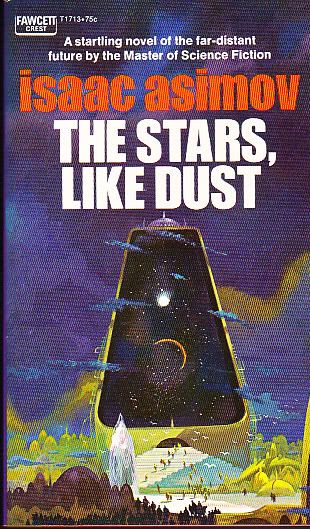CC, Pebble isn't a reread for me, but, yes, sometimes there's a nostalgia element. Certainly I prefer to read these old books in old editions. (I don't care about the condition much.)
Now here are some comments on Pebble:
Pebble in the Sky (1950), in a 35c Bantam Giant edition, begins my Asimov tour. I liked the economical storytelling; the text ends on the bottom of page 200 (so “Giant” in the publisher’s description is a bit generous. Economical storytelling is one of the things I like about the classic sf novels of 60 years or so ago. I like lots of long books too (e.g. Dickens’s), but I think sf is often well suited to the novella or short novel length.
It seems to me that Sir Walter Scott said, of one of his novels, that it was not good, but there were good things in it. Pebble provided what I wanted – enjoyable, relatively light reading, so in that sense it was good. It’s vulnerable to easy-to-make criticisms. For example, one of the chief characters, Schwartz, is a man from our own time (as of the time the book was published), but I'm not sure that this is essential to the plot. It’s a convenience in that it gives the reader someone easy to identify with as we get acquainted with this distant future. Schwartz gets a Synapsifier treatment that enhances his mental abilities, including telepathy and the ability to defend himself via a sort of mental bolt, but unless I missed something, the treatment would have worked on a person of the time when the device was invented. However, having an ordinary joe like us save the galactic empire provides an extra element of escapism.
In this future, there are 200 million inhabited planets “and an approximate population of five hundred quadrillion people” (p. 133). I assume Asimov was thinking of U. S. usage for “quadrillion”, so that’s 500, 000,000,000,000,000 – right? All of them are descended from Earthmen and look and talk* like Earthmen – indeed, pretty much like Earthmen of 1950, although most citizens of the Galactic Empire believe in a parallel evolution explanation for a multiple-plaent origin of the galaxy's people; their real origin is long forgotten.** The theme of the real origin of all these future people in settlers from or descended from Earth people is an interesting one, one of the ideas that Asimov doesn’t really develop. In a way, I liked that.
Earth is largely a radioactive wasteland in this distant future. However, blurred but familiar city names remain – Washen, Sanloo, etc. The supreme world is Trantor.
Blaster-packing Balkis and his confederates mean to exact a horrible revenge upon the Galactic empire for its disdain of the “pebble in the sky,” Earth. The phrase is that of Dr. Shekt (p. 33), inventor of the Synapsifier and father of a daughter with beautiful eyes and light brown hair, with whom Bel Arvardan, an Empire archaeologist, falls in love. At first we expect Schwartz clearly to be the protagonist of the novel, but eventually Asimov makes it more of an ensemble affair than that. Arvardan, Shekt, daughter Pola, and Schwartz oppose the plot, which it is hard to believe would really have succeeded. It’s fun to get to the point where it’s thwarted, though.
*I don't want to be misleading. Actually, Schwartz and the speakers of the future language can't understand each other at first. What I meant was that, the speech of the future people as represented by Asimov's English is basically ordinary contemporary English. This seems to suggest that the semantics haven't changed much in all those years although the sound and, presumably, spelling of words has changed some (so that Fort Dearborn is Fort Dibburn, etc.).
**There are no "aliens" in the whole galaxy, it seems.


